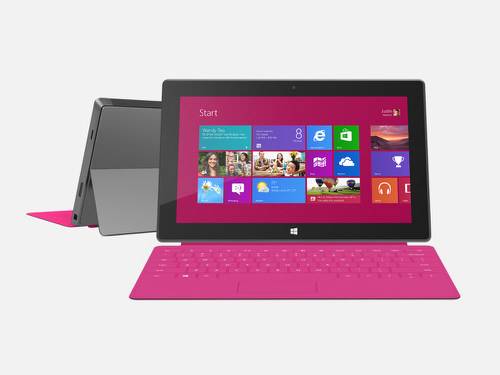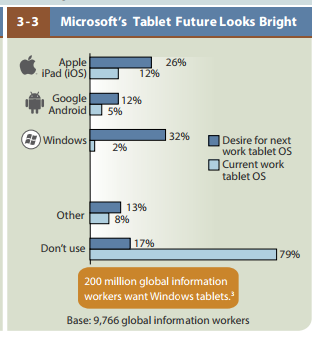
Good news for Microsoft: 200 million information workers want Windows tablets, a report from Forrester claimed Monday, quite a few more than the 900,000 Surface RT tablets that IDC estimated have already been sold into the channel.
If Forrester’s numbers truly reflect reality, they indicate a huge pent-up demand for the Surface Pro, which goes on sale this month. The report concludes that both Apple and Microsoft will go at each other’s throats to win knowledge workers to their respective camps, riding the wave of the Bring Your Own Device (BYOD) trend. And believe it or not, those workers want Windows tablets like the Surface more than they want iPads.
Forrester also concludes that it’s probably curtains for BlackBerry, which the research house labels a “fading presence”.
The strongest argument for the legitimacy of the data is the sample size of 9,766 information workers that Forrester polled. Typically, market research firms – whether asking questions about technology, political candidates or laundry soap – poll a representative group of respondents and try to extrapolate that data out to the entire population in question, usually Americans or even worldwide users. The larger the sample size, typically, the greater the reliability of the findings.

So what did Forrester’s report conclude?
1.) Apple will win the next-gen smartphone war. Today, 92% of desktop PC users run Windows, 87% of notebook users do the same, while Apple powers 58% of the tablets. Android edges Apple in smartphone use, 37% to 34%. But 33% of workers want their next phone to be an iPhone; 22% want an Android phone, and 10% want a Windows phone. Some 7% own a BlackBerry, and apparently those same 7% want another.
2.)Windows tablet demand tops Apple. Easily the biggest surprise of the report. Of those IT workers polled, only 2% own a Windows tablet. But 32% want one. That tops Apple, with just 26% of those polled wanting an iPad and 12% hoping for another Android tablet.
“For CIOs, there are three mandates that arise from this data: 1.) Apple and Android will be major suppliers to the enterprise. 2.) Microsoft has a fighting chance in tablets. 3.) The workplace of the future is multiplatform,” Forrester’s report claims.
3.)More workers are bringing their own devices to work, and more are paying for them, too. Forrester claims that we haven’t yet hit what it calls “peak BYOD.” But aleady more than a third of workers who bring smartphones and laptops into the office picked what they wanted, themselves, the report found. About 12% of workers bought (or were forced to buy) their notebooks themselves, and 18% more (or 129 million workers) bought their own phones.
In total, 36% of the knowledge-based workforce is ready and willing to pay for the computer they want, the report found. “We read that result as code for “I’d like a MacBook or iMac, please,” Forrester said.
The report also noted that more and more employees don’t mind having their devices managed by their employer. If a worker loses a cell phone, for example, an IT shop that activates a “kill switch” will wipe the user’s device. Workers these days are finding that blocking a thief’s access to their personal data is as valuable as blocking access to corporate data, the report concluded.
With more and more workers using multiple devices – desktop, notebook, phone and tablet – and IT shops allowing these devices onto the corporate network, Microsoft may be right – the world may indeed want Windows.
Microsoft Q&A With Tami Reller
That’s all certainly good news for Microsoft, but Windows 8’s future remains far from certain. In a “question and answer” session with Windows marketing officer Tami Reller published Monday, Reller stuck to the party line about how “more than 60 million licenses” had been sold for Windows 8, “on par with the record-setting pace we saw with Windows 7.”
“With Windows 8, we’ve built an OS that scales across the entire segment: tablets, to PCs to everything PCs can become, with one consistent scalable experience,” Reller said. “Windows 8 is a big, ambitious change and as I said, we’re only just getting started.”
Nothing has changed here. Reller is repeating the same points that she has been hammering for weeks now. Yes, Microsoft delivered solid financial results for the most recent quarter. But persistent questions about Windows 8 demand have lingered, and Forrester’s report may have answered some of them.

















